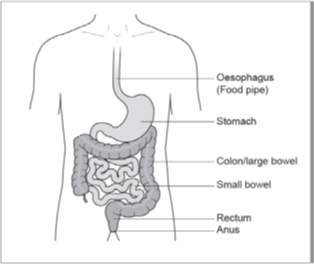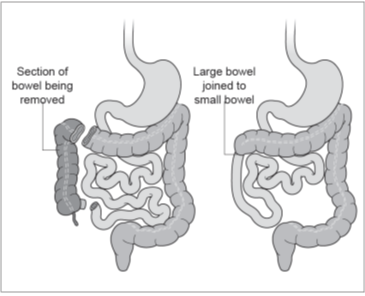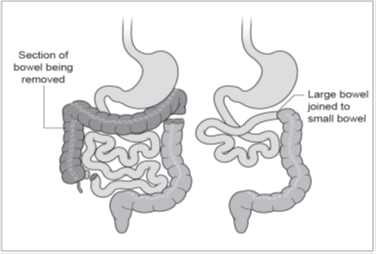Right hemicolectomy or extended right hemicolectomy
This page gives you information about the procedure known as a right hemicolectomy and extended right hemicolectomy which are performed to remove a diseased area in your bowel. It explains what the procedures involve and also some of the common complications associated with them.
On this page
-
The digestive system
-
What is a right hemicoletomy or extended right hemicolectomy?
-
Will I need a stoma?
-
What is keyhole surgery?
-
Potential risks and complications of the surgery
-
What are the benefits of the procedure?
-
Alternative treatments
-
How long does the operation take?
-
How long will I be in hospital?
-
Pre-operative, post-operative and discharge advice
-
Results (if your operation has been performed to remove a cancer)
-
Follow-up
-
Contact information
-
Further information
The digestive system
To help you understand your operation, it is helpful to have a basic knowledge of how the body works (see Figure 1 below).

When food is eaten, it passes from the mouth down the oesophagus (food pipe) and into the stomach. The food is broken down and becomes semi-liquid. It then continues through the intestine (small bowel), which is many feet long, where food is digested and nutrients are absorbed.
The semi-liquid food then passes into the colon (large bowel) where it becomes faeces (stools). The main job of the colon is to absorb water into our bodies making the stools more solid.
The stools then enter a storage area called the rectum. When the rectum is full, we get the urge to open our bowels. The stools are finally passed through the anus (back passage) when we go to the toilet.
What is a right hemicoletomy or extended right hemicolectomy?
The decision about whether you need a right hemicolectomy or an extended right hemicolectomy depends on the exact location of the diseased area in your bowel. The dark shaded areas in the diagrams on the next page (Figures 2 and 3) show which part of the bowel is to be removed for each operation.


A cut will be made in your abdomen (tummy) and the surgeon will remove the diseased area of bowel. The two healthy ends of the bowel are then joined by stitching or stapling them together (anastomosis). The wound on the abdomen is usually closed with dissolvable stitches.
Will I need a stoma?
It is extremely uncommon for the ends of the bowel not to be joined together and a stoma ‘bag’ to be needed. The surgeon may think it safer to bring the end of the bowel onto the abdominal wall as a stoma if the operation is performed as an emergency, if the bowel ends are unhealthy or if there is a risk of a join not healing due to low protein levels in your blood (an indicator or poor nutrition).
Before your operation, your consultant surgeon and colorectal nurse specialist will carefully explain the procedure involved. You will be asked to sign a consent form to confirm that you understand and agree to have the procedure.
The procedure may either be performed as an ‘open’ operation which involves making a large cut in the abdomen or using laparoscopic (keyhole) surgery.
What is keyhole surgery?
Keyhole surgery involves carrying out an operation through small cuts in the abdomen. The surgeon inserts a narrow telescope attached to a camera and other special instruments, through the cuts to remove the affected part of bowel.
Most of the operation is made through these cuts, but a slightly larger opening is needed to remove the section of bowel from the body. The decision about whether to use open or keyhole surgery will be made after a discussion between you and your surgeon. In particular, your surgeon has to consider whether your condition is suitable for keyhole surgery, together with the risks and benefits of both procedures.
The benefits of keyhole surgery include:
- A reduction in the length of your hospital stay
- Reduced discomfort following the surgery
- A smaller scar
The risks associated with keyhole surgery are the same as for open surgery. If for technical reasons it is not possible to complete your operation using keyhole surgery then the surgeon would need to proceed to an open operation. This will be discussed with you during the consent process.
Potential risks and complications of the surgery
Removing part of the bowel is a major operation. Risks with this operation include:
Anastomotic leak
Sometimes, the anastomosis (join in the bowel) leaks. Treatment with antibiotics and resting the bowel are generally enough to resolve the problem, however, this may be a serious complication which needs further surgery and formation of a stoma.
Ileus (paralysis of the bowel)
Sometimes, the bowel is slow to start working after surgery which causes vomiting and delays you from eating and drinking normally. If this happens, the bowel may need to be rested and a drip (a tube into a vein in your arm) is used to give you fluids (instead of drinking). In addition, you may also need a nasogastric tube (tube in your nose which passes into your stomach) so that fluid collecting in your stomach can be drawn off. This helps to prevent nausea and vomiting and remains in place until the bowel recovers.
Adhesions (scar tissue)
With any abdominal surgery, there will be some formation of scar tissue. This is known as adhesions. In some people, this can lead to further problems which may require more surgery, but this is rare.
Pressure ulcers
Pressure ulcers, also known as pressure sores are caused by a combination of pressure, shearing and friction on the skin. The nurses looking after you will assess your risk of developing a pressure ulcer daily and will check your pressure areas regularly. You will be encouraged to change your position at regular intervals for pressure area relief. You will be assisted by your nursing staff if you need help to move.
Chest infection
You can help by practicing regular deep breathing exercises and following the instructions of the physiotherapist. If you smoke, we strongly advise you to stop.
Wound infection
If your wound becomes infected, this is usually not serious but may require treatment. You may be given antibiotics or if there is a collection of fluid this may need to be released to allow your wound to continue to heal.
Thrombosis (blood clot in the leg)
Major surgery carries a risk of blood clot formation in the leg. To reduce this risk, a small dose of blood thinning medication will be given once a day by injection until you go home. It is likely that you will need to continue these injections for a short period of time at home.
The nurse on the ward will help to train you so that you are able to do this safely or provide alternative arrangements with the community nursing team, if needed. You will also be fitted with support stockings to be worn during your hospital stay. You can help to reduce the risk of blood clots forming by moving around as much as you are able to and particularly by exercising your legs.
Pulmonary embolism (blood clot in the lung)
Rarely, a blood clot from the leg can break off and become lodged in the lungs. This would need treatment with blood thinning medication.
Bleeding
A blood transfusion may be needed during or after your operation. Very rarely, further surgery may be required if there is continued bleeding after your operation.
Risk to life
An operation to remove part of the bowel is classified as major surgery. It can carry a risk to your life. Your surgeon will discuss this risk with you.
Most people will not experience any serious complications from their surgery. However, risks do increase with age and for those who already have heart, chest or other medical conditions such as diabetes or for those who are overweight or smoke.
What are the benefits of the procedure?
The operation aims to remove the diseased bowel. In most cases this will give you the best chance of a cure or significant improvement in your bowel problems.
Alternative treatments
If a right hemicolectomy or extended right hemicolectomy has been recommended by your surgeon as the best treatment option, not having this surgery may lead to a further worsening of your health. Depending upon what is wrong with you, you may develop a blockage in the bowel, leakage from the bowel into the abdomen or an abscess, all of which can be life threatening. If you have cancer, the longer it remains the more likely it is to spread and become incurable.
For most of the conditions where this surgery is advised, the only alternative is medical treatment. Where there is cancer of the bowel, treatment such as chemotherapy alone will not cure the disease. Your surgeon will discuss any queries you may have.
How long does the operation take?
This operation takes between 1½ and 2 hours, however you will be off the ward for longer than this because of the time spent in the anaesthetic room before your operation, and time in the recovery room afterwards. When you are fully awake after your anaesthetic, feeling comfortable and your general condition is stable, you will be taken back to the ward.
How long will I be in hospital?
During your admission, you will be following an enhanced recovery programme which aims to help you recover quickly and safely. We would estimate that you should be ready for discharge within 5 days if your recovery is uncomplicated.
Pre-operative, post-operative and discharge advice
For further information about what to expect when you come into hospital, what your recovery will involve and for discharge advice, please refer to leaflet GHPI0815 ‘Enhanced recovery programme for colorectal surgery’. You should have been given a leaflet of this information by your colorectal nurse specialist before your surgery.
Results (if your operation has been performed to remove a cancer)
During your operation, the bowel and surrounding tissue that is removed will be sent to the histology laboratory for analysis (examination). The analysis process is very detailed and it will take about 7 to 10 days for the results to return.
These results will then be discussed at a colorectal cancer specialist multidisciplinary team meeting. At this meeting, a consultant histopathologist will discuss the stage of your tumour in detail. The ‘stage’ is a term used to describe the extent of the cancer in the body. A joint decision between the specialists will then be made about whether or not further treatment should be recommended for you, such as chemotherapy or radiotherapy.
The multidisciplinary team will include:
- Colorectal consultant surgeons
- Clinical consultant oncologists
- Consultant radiologists
- Consultant pathologists
- Colorectal clinical nurse specialist’s
- Other specialists such as stoma nurses, the palliative care team, consultant gastroenterologists
Depending on your wishes, you can either be informed about your results by a telephone call from your specialist nurse or at an outpatient appointment with your consultant or specialist nurse.
Follow-up
Once you are discharged, your colorectal nurse specialist will make telephone contact to assess your general well-being within 24 to 48 hours. Alternately they will provide details while you are in hospital as to who you can contact if you have any concerns.
You will be seen for an outpatient appointment about 6 weeks after your discharge.
You will either be seen by your consultant or a colorectal nurse specialist who will assess how well you are recovering from your operation and check your wounds.
If your operation was performed for cancer and you have requested to receive your histology results in clinic, then you may be seen 2 weeks following your discharge. Your consultant or colorectal nurse specialist will also discuss with you your individualised follow up.
The stoma nurse specialist will telephone you after your discharge and will plan to visit you at home about a week after to check the stoma, or to see you in an outpatient clinic.
Contact information
Colorectal Nurse Specialist
Gloucestershire Royal Hospital
Tel: 0300 422 5617
Monday to Friday, 8:00am to 4:00pm
Outside of these hours, please leave a message and someone will return your call the next working day.
Stoma Nurse Specialist
Cheltenham General Hospital
Tel: 0300 422 4363
Monday to Friday, 8:00am to 4:00pm
Gloucestershire Royal Hospital
Tel: 0300 422 6702
Monday to Friday, 8:00am to 4:00pm
Outside of these hours, please leave a message and someone will return your call the next working day.
If you have an urgent problem, the stoma nurses can be contacted via the hospital switchboard.
Gloucestershire Hospitals Switchboard
Tel: 0300 422 2222
When prompted ask for the operator then the stoma nurses.
Further information
Macmillan Cancer Support
Tel: 0808 808 00 00
Monday to Friday, 9:00am to 8:00pm
Website: www.macmillan.org.uk
Bowel Cancer UK
Website: www.bowelcanceruk.org.uk
FOCUS Cancer Information Centre
Cheltenham General Hospital
Tel: 0300 422 4414
Monday to Friday, 8:30am to 4:30pm
Maggie’s Centre
College Baths Road Cheltenham
Tel: 01242 250 611
Monday to Friday, 9:00am to 5:00pm
Mini’ Maggies
The Main Place, Old Station Way, Coleford, GL16 8RH
Tel: 01242 250 611
Offering practical and emotional support, facilitated and peer support groups as well as fitness and relaxation classes.
Sessions run on the third Friday of each month from 10:00 am to 2:00 pm.
Macmillan Information Hub
Gloucestershire Royal Hospital
To access the service either drop in (no appointment needed) or call 0300 422 8880
Email: ghn-tr.macmillanhub@nhs.net
Monday to Friday, 9:00 am to 4:00pm